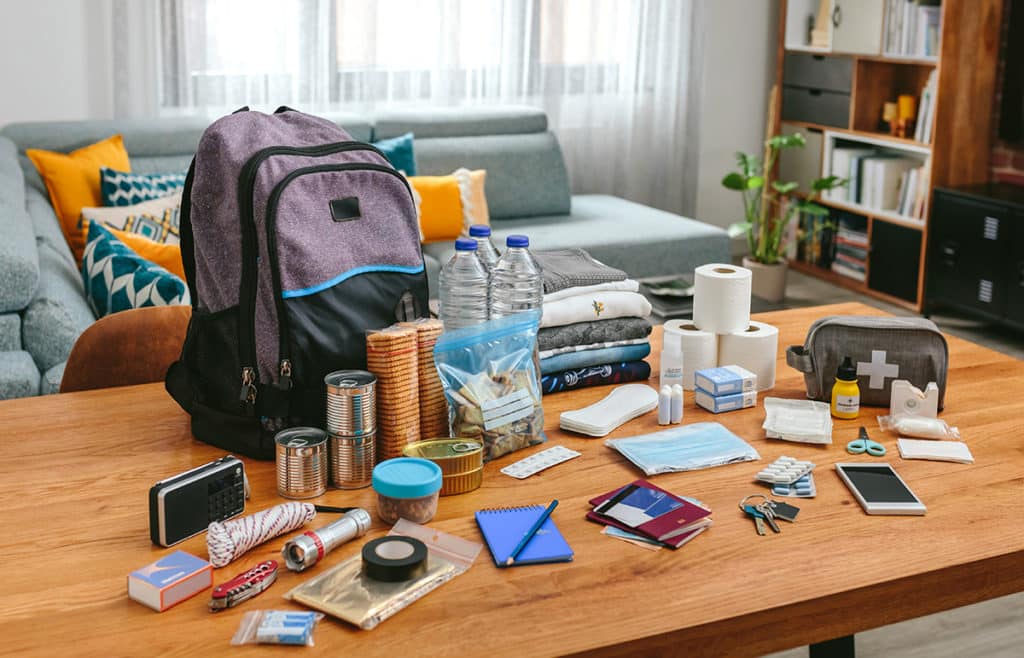You should be prepared to take care of yourself and those in your household – including pets – for at least 72 hours. Build an emergency kit in advance so you can grab it at a moment’s notice, whether you need to evacuate or shelter in place.
You should check your kit each season to make sure your supplies are fresh and address your current needs.

Emergency Kit Checklists
Special Items to Pack in Your Kit
Pregnant or breastfeeding individuals
If you are pregnant, breastfeeding or have infant children you will want to include:
- feeding items:
- breastfeeding aides, such as a breast pump and nursing bra
- formula
- bottles
- extra water
- diapers, wipes and extra clothes
- prenatal vitamins, ointments and medications for mom and child (over-the-counter and prescription)
Allergies and chronic conditions
If you have severe allergies, dietary restrictions, chronic medical conditions or other medical needs, you will want to include the necessary supplies. For example, if you have diabetes you will want to include:
- MedicAlert bracelet or identification
- extra supply of insulin or oral agent
- pump supplies, syringes, needles and insulin pens
- small container for storing used syringes and/or needles
- blood glucose testing kit, spare batteries and record book
- supply of blood glucose and urine ketone testing strips and fast acting insulin for high blood glucose, if needed
- fast acting sugar for low blood glucose
- extra food to cover delayed meals
- ice packs and thermal bag to store insulin
- additional snacks to maintain blood glucose
Talk to your healthcare professional for advice.
Mobility needs
If you have mobility needs you will want to include additional supports. For example, if you use a wheelchair you may want to include:
- tire patch kit or can of seal-in-air product to repair flat tires on your wheelchair or scooter
- supply of inner tubes
- pair of heavy gloves to protect your hands while wheeling over glass or other sharp debris
- latex-free gloves for anyone providing personal care to you
- spare deep-cycle battery for a motorized wheelchair or scooter
- a lightweight, manual wheelchair as a backup to a motorized wheelchair, if possible
- spare catheters, if needed
- your power outage backup emergency plan
Pets
Preparedness is different for every pet. The below list includes basic supplies; adapt the list to meet the needs of your pet(s).
- leash, collar or harness
- travel cage/carrier
- food for a minimum of three days
- water (minimum of one gallon per day is recommended per animal)
- medications
- dishes for food and water
- pet bed, blanket or towel
- familiar toys
- plastic bags, newspaper, cleaner or disinfectant
- current photo of each animal, a description of any unique markings should be noted on the back of the photo if printed
- paperwork (licensing, vaccination records, insurance information)
- emergency contact information, and list of contacts (vet, previous kennel, friends and family in case you are unable to be reached)
Tip: store your pet items in the carrier or crate to make it easy to find and grab.
Livestock
Create an emergency kit for farm animals and livestock ahead of time to make an evacuation easier. Some things to consider are:
- feed and water that does not require power
- first aid kit and supplements
- list of medications, veterinarian records, animal identification, health and sale records and proof of ownership
- handling equipment (e.g., ropes, cages, halters warm bedding and fence cutters)